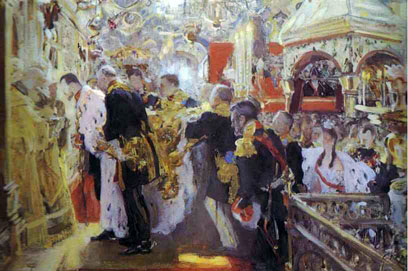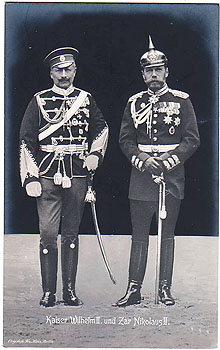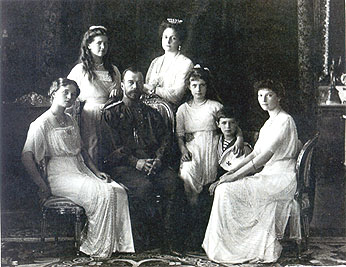Nicholas II was not the luckiest person in the world; nor did he ever seem to be blessed with enormous reserves of common sense. One of my professors at the University of Virginia always said that Nicholas reminded him of the cartoon character who always had a black cloud hovering over his head.

1. An unlucky
birthday?
"Nicholas II took it as a confirmation of his hard lot, his
destiny from the very day of his birth May 6, 1868, the martyr
St. Job's Day."
(www.angelfire.com/pa/ImperialRussian/royalty/russia/coronation.html)

2. Bad wedding
timing
(A marriage during the official mourning period for
his dad, Alexander III.)
"As for the Tsar [Alexander III] himself, his condition began to
worsen and at his doctor's recommendation, he was moved to the
Crimea with Maria and Nicholas. He appeared to improve but then
his health deteriorated rapidly and Nicholas sent for Alix [Alexandra], who
came quickly and they were formally betrothed. [Nicholas had
proposed to her earlier that year, but Alexander III had refused
to approve.] Tsar Alexander III died suddenly, leaving an unsure
Nicholas to reign over Russia (Mazour 123). The morning after
Alexander's death, Princess Alix converted to Orthodoxy and took
the name of Grand Duchess Alexandra Fedorovna. (Massie 44) The
wedding was moved forward at Nicholas' request and one week after
the funeral of Alexander, Nicholas and Alexandra were married in
the chapel of the Winter Palace. (Lincoln 26) Because everyone
was still in mourning, there was no honeymoon or reception after
the wedding." (it.stlawu.edu/%7Erkreuzer/pstahl/nalove2.htm)
Because the wedding took place so close to the funeral, Alexandra was called the "funeral bride."

3. Coronation ceremony bad omens
On 26 May 1896, Nicholas and Alexandra were crowned in the Cathedral of the Assumption in Moscow. During the ceremony, which lasted five hours, Nicholas was invested with the orb, the scepter and the chain of the Order of St. Andrew. |

Valentin Serov, Coronation of the Emperor Nicholas II in The Uspensky Cathedral. (1896, Oil on canvas, Tretiakov Gallery, Moscow) |
|
"After being proclaimed Emperor and Autocrat of all the Russias, Nicholas II entered the sanctuary, for the only time in his life, to celebrate the mass as a priest of the Orthodox Church. As he walked up the stairs, the chain of the Order of St. Andrew slipped from his shoulders and fell to the floor, a fact which was taken as a bad omen by those who saw it." (Source: www.geocities.com/jesusib/Nicholas.html) "As an example [of bad
common sense], his coronation address was merely a repeat of what
Alexander III had said." |
|

3. Khodynka Field
Stampede
"Four days later, as it was the costume (sic) at the Tsar's
coronation, a banquet was going to be held for the people at
Khodynka Meadow, a field outside Moscow. There would be free
beer and gifts for everyone. [The rumor was that rich gifts were
to be distributed; in actuality the gift was to consist of a
"roll, a piece of sausage, gingerbread and a mug" (en.wikipedia.org/wiki/Khodynka)] A
night before, people began to crowd at Khodynka; at dawn a half
million people had gathered there, where they could see the beer
and the gifts, awaiting for them. Only sixteen men had been
assigned to keep order among the crowd. Suddenly a rumor spread
among the people that there were not enough beer and presents for
everybody. The crowd began to push themselves, falling down and
crushing between them. It all happened in 15 minutes; there were
1429 dead and thousand of wounded. When they learned about the
tragedy, Nicholas and Alexandra were shocked; they spent the rest
of the day visiting hospitals and comforting the wounded. That
night a ball given by the French embassy, was going to be held.
The Minister of Finance, Sergei Witte, suggested that the ball
should be canceled in spite of the tragedy, but Nicholas' uncles,
Grand Dukes Vladimir, Alexis, Serge and Paul advised their nephew
that he and Alexandra must attend the ball for diplomatic
reasons, and so they did." (Source: www.geocities.com/jesusib/Nicholas.html) [actual
casualties were closer to 1300 dead and an equal number
wounded.]
From the Memoirs of Maurice Paleologue, the French ambassador to Russia, (www.alexanderpalace.org/mpmemoirs/3_2.html, entry for Thursday, September 21, 1916.)
"The first occasion was during the celebrations attending his coronation at Moscow on May 18, 1896. A public fête had been arranged in Khodinsky meadow, near Petrovsky park. But the police arrangements were so bad that the crowd began to heave violently. Suddenly there seemed to be a panic and a general stampede ensued; there were four thousand victims, of which two thousand died. When Nicholas II heard of the catastrophe he did not display the slightest sign of emotion and did not even cancel a ball for that evening.
Nine years later, on May 14, 1905, Admiral Rojdestvensky's fleet was utterly destroyed; with it disappeared Russia's whole future in the Far East. The Emperor was just about to play a game of tennis when the telegram announcing the disaster was handed to him. He simply said: "What a horrible catastrophe!" and without another word, asked for his racket.
"If only his diary would
always contain such joyous entries . . . but on the evening of
May 18, a horrifying diary entry would pierce the pages: 'Till
this day, thank God, everything has been going quite smoothly,
but today a grave sin has befallen. The crowd who spent the
night in the Khodynskoye Pole (meadow) pending the giving out of
a dinner and a mug, pressed upon the wooden constructions, and
there was a terrible jam, and it's dreadful to add, about 1300
people were trampled down!"
(www.angelfire.com/pa/ImperialRussian/royalty/russia/coronation.html)

4. Who was who?
The tsar, the king of England and the German kaiser were all good friends; they all looked quite alike; and might have been quite interchangeable For more pictures of the
striking family resemblances, see
www.gwpda.org/photos/bin04/imag0347.jpg |

Tsar Nicholas and Kaiser Wilhelm |

5. Got to have a son
There were enormous pressures put on Alexandra to give birth to a son, especially after she gave birth to girl after girl after girl after girl. (See Robert Massie, Nicholas and Alexandra.)
Once Aleksei was born, "weeks after Alexis' birth, he began to bleed from the navel; it lasted two days and although the doctor applied all kinds of bendages (sic) and cures, the bleeding didn't stop. When the Tsarevitch began to walk and he tumbled, big swellings were formed under his skin and he cried out in terrible pain. Alexandra was shocked; it was evident that Alexis had haemophilia, the terrible blood disease transmitted by her family." (Source: www.geocities.com/jesusib/NicholasII.html)
This of course opened the door for Rasputin.
"Relating indirectly to Alexei's illness came a person who had great influence over the Tsar and Tsarina. Twice when Alexei was suffering a great deal as a result of his hemophilia and appeared to be on his deathbed, a man named Gregory Rasputin intervened to "save" him. Rasputin was an illiterate Siberian peasant supposed to have strange religious powers. Though it was never clear if it was indeed his prayers that saved Alexei and later the Empress's good friend Anna, Alexandra believed fully in his powers and adopted him as her friend, confidant and advisor. (Mazour 134, Massie 334)" (it.stlawu.edu/%7Erkreuzer/pstahl/nalove2.htm)
Unfortunately, the decision was made to keep Aleksei's illness secret; this led to all kinds of ugly rumors being circulated; it also did not generate any public sympathy or support.
This is one of the classic photos of the tsar with his family.


6. Not a good way to die
For details about their slaughter--no other real way to describe it--in 1918 at the hands of the Bolsheviks, see
- Did the Romanovs Die?
- Execution
- The Execution of Tsar Nicholas II, 1918
- Anastasia and Anna Anderson
- John Varoli, The Romanovs Time in Exile (notes the execution of other members of the Romanov family)
- The Missing Romanovs
- Mark Weber, The Jewish Role in the Bolshevik revolution and Russia's Early Soviet Regime (Ignore the anti-semitic bias in this article; there is still some good information here)